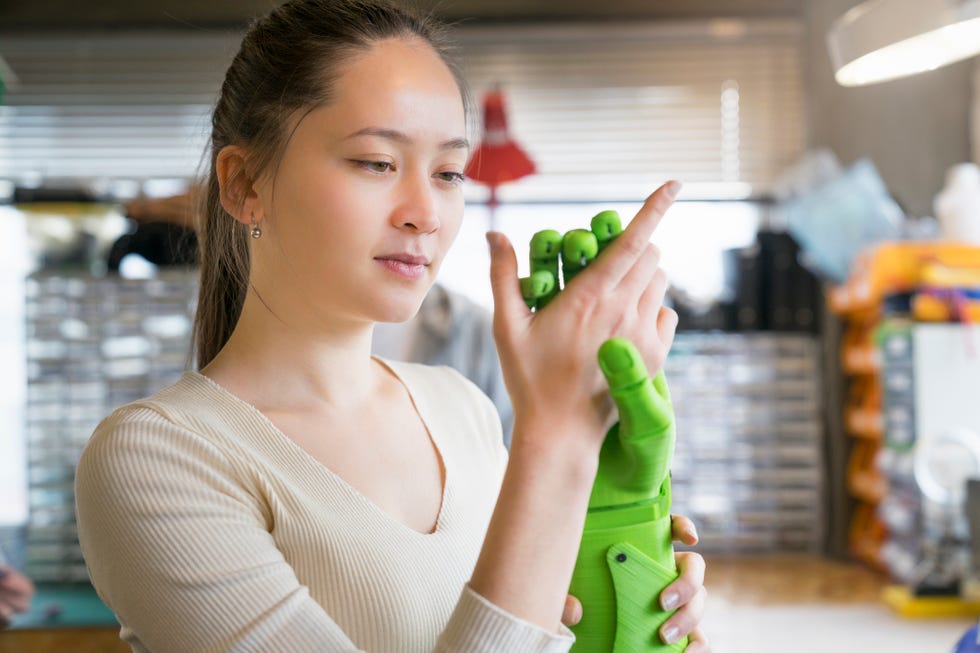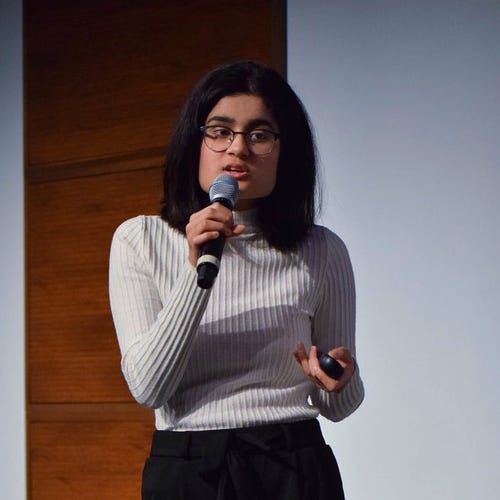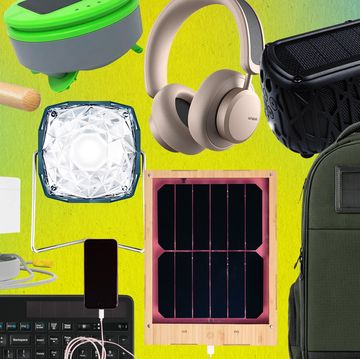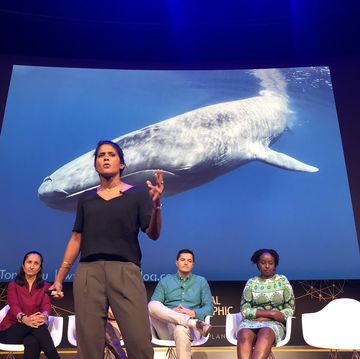Let's talk about power. Shondaland is diving deep into everything from money to technology to the power that lies within each of us. The goal? To examine all aspects of power: who has it, how they got it, how they keep it, and what they are doing with it.
The word “innovative” has arguably lost its punch, right along with “disruptive”, “awesome,” and “amazing.” Many times, tech startups and their founders get called out for hyping their products as innovative, when they’re really just building apps that help you book a babysitter or nail appointment on the fly. And while these kinds of tech startups are doing great work — and making our lives more convenient in the process — they're not necessarily creating game-changing technology.
But then there are startups like Issinova.
The Italian engineering firm teamed up with Decathlon, an athletic equipment company, to use the blueprints of a snorkeling mask to make emergency respirators to serve patients during the coronavirus crisis. Together, the companies leveraged 3D printing to quickly help get the respirators to hospitals that needed them.
That’s the power of impact innovation — which can loosely be defined as harnessing emerging technologies to create solutions to urgent, sometimes life-threatening, problems. Pacemakers and ventilators are two poignant examples of impact innovation.
Whether for-profit, non-profit, or somewhere in between, impact innovation startups around the globe are working to help combat issues like infectious diseases, hunger, the housing crisis, and climate change.
What does impact look like? And how do we get there?
Though there’s no governing body tasked with defining what constitutes “positive social impact,” many in the impact innovation community use the United Nations’ Sustainable Development Goals (SDGs) as a benchmark.
Publicly declared in 2015, the SDGs are a collection of 17 goals developed to help address problems like poverty, lack of access to clean air and water, sustainable economic development, and, ultimately, peace and prosperity for all.
Since eradicating hunger and achieving world peace are mammoth tasks — even on the 15-year timeline laid out by the UN — impact innovation startups and the organizations that invest in them typically measure the potential impact of a project by answering more granular questions like how many people will benefit, and what’s the “depth” of the benefit per person.
For example, The Human Utility is a project that helps Detroit residents access (and pay for) clean water. It delivers an immediate and substantial benefit to every family that receives support. Contrast that with Frank, an AI-driven app that helps low-income students navigate the complexities of filling out financial aid forms for college, and the benefits are significant — just not as immediate as clean water.
What makes impact entrepreneurs and their companies truly innovative is that they often use emerging tech like blockchain or artificial intelligence (AI) to break down those lofty UN goals into tangible solutions that help real people.
Some startups that are attempting these lofty goals are relying on blockchain.
So first, a quick blockchain primer. You’ve probably heard the word, but you might think blockchain is the same thing as Bitcoin or another cryptocurrency. But blockchain and cryptocurrency are not synonymous. At its most basic level, blockchain is a system of recording and storing information — be it a record of transactions, a record of someone’s vote, or even a medical record.
Think of it as a ledger that keeps track of all that data, except instead of paper, the assets and information are stored digitally in individual “blocks.” Once a single block gets full, a new block must be created to store more data, and each entry must be checked for accuracy by a network of computers scattered around the globe.
Because the computers are not in one location, there’s no central place where you can access or alter everyone’s blockchain details. This “decentralization” means that the flow of information cannot be controlled by a specific bank, organization, government or other entity. And since all records must be verified by multiple computers, blockchain technology can offer a heightened level of transparency and security at the same time.
“I’m seeing more women use blockchain to create impact businesses because it helps enable the equal distribution of information and resources — while making that distribution process more transparent and secure,” said Melissa Jun Rowley, a journalist and entrepreneur who focuses on highlighting the work of impact innovation startups at events like the World Economic Forum.
This is partly why companies like Facebook are eager to use blockchain technology to create their own payment systems and digital currencies, and why it seems like the market exploded around cryptocurrencies like Bitcoin. But the power of blockchain goes beyond just letting people pay for things — this emerging technology can help secure and democratize a variety of industries, from online voting, to storing and sharing medical records, to recording how entire cities are consuming energy.
Bringing clean energy to Puerto Rico, one family at a time
Genmoji is an impact innovation startup that helps Puerto Rican families generate their own electricity by installing solar panels and batteries on their property. Once established, property owners no longer need to depend on the government-owned Puerto Rico Electric Power Authority (or PREPA) for their electricity, and they can even sell the excess energy they generate using a blockchain marketplace like GridPlus.
Founded in the wake of 2017’s Hurricane Maria, Genmoji initially focused on creating photovoltaic systems — small batteries and solar panels — for 150 homes. But as the entire island’s existing energy infrastructure was “unreliable, outdated and expensive,” founder Vanessa Carballido said the relief project attracted the attention of bigger, corporate interests.
Now Carballido and her team are taking on solar microgrid projects that have the potential to impact entire neighborhoods.
Solar microgrids are larger, completely self-contained systems that produce, transmit and distribute clean energy across multiple properties — typically industrial parks or groups of apartment complexes. (The problem is that they’re expensive to build and often require corporate or government backing).
With contracts to develop microgrids to power the offices and warehouses for multiple companies that share a single industrial zone, Genmoji has the corporate backers. But the startup has engineered it so that any new microgrid project it takes on must extend the energy-generation capabilities to the surrounding neighborhood. In this way, with every new corporate microgrid that gets built, Genmoji is able to bring solar power to the adjacent communities which are often low income.
“Climate change is real,” Carballido said. “With these projects, we’re able to help families reduce their carbon footprint, improve their economic status, and move outside of the energy monopoly that exists here.”
Fair prices and financial literacy for the world’s farmers
AgriLedger is dedicated to bringing more transparency to how staples like fruit, coffee, and cocoa are grown and trafficked, while ensuring that farmers and their families get a fair value for their crops.
Initially launched out of a London hackathon in 2016, AgriLedger is now working with Haiti's Ministry of Commerce and Industry on a World Bank-backed project to increase the country's fruit exports.
AgriLedger’s blockchain-based solution helps empower Haiti’s farmers in two ways.
First, it gives them the ability to keep track of every piece of produce from “seed to sale” — documenting things like which nutrients or pest control methods were used. The records also “reduce the potential for fraud, theft or waste,” said founder Genevieve Leveille.
The app also allows producers to take direct payments for their goods through mobile devices, eliminating the need for third-party resellers or distributors that might take advantage by marking up costs or just taking a cut of the proceeds overall.
“Building a sustainable future for Haiti is about more than just bringing in foreign aid,” Leveille said. “Ultimately people need to be educated and empowered to make good financial decisions again and again, and that’s one of the ways we can help with AgriLedger.”
Data, machine learning, and artificial intelligence
For some, the concept of artificial intelligence (AI) conjures up images of sentient machines and murderous robots a la Terminator 2. In reality, it’s a bit less sinister.
Oxford University Press defines AI as “computer systems able to perform tasks that normally require human intelligence such as visual perception, speech recognition, decision-making, and translation between languages.”
Robots fall into the AI category, but there are other uses for artificial intelligence too. Essentially, AI is all about allowing computers to do what they do best — process large volumes of data and information quickly. And organizations like ATLytics that tap the power of AI are holding the keys to a powerful new future.
Using AI to help Atlanta tackle suicide
Founded in late 2017, ATLytiCS members use computer programs and languages to crunch numbers on behalf of other non-profits. Their partner organizations then use the findings to make better business or operational decisions.
“We’re an army of amateur and professional data scientists working on projects that range from reducing domestic violence to helping figure out how and where to provide more affordable housing,” said co-founder and operating officer Beverly Wright.
In one project, the ATLytiCS team was able to help a suicide prevention group determine the days and times of the week that represented the highest risk in terms of call volume around self-harm attempts. After examining months’ worth of data, they were able to recommend that counselors schedule more check-in calls and therapy sessions on specific days.
Safer prescriptions and smarter, cost-friendly prosthetics
For Alishba Imran, an interest in all things computing led her to the realm of AI, machine learning, and robotics.
At 16, she co-founded Honestblocks, a blockchain-based tracking app designed to help put an end to counterfeit medication. (Whether a heart medication accidentally gets mislabeled, or a dealer maliciously swaps a pricey malaria drug for acetaminophen, fake meds kill upwards of 250,000 children in developing countries every year, according to the World Health Organization).
Developed as part of Imran’s participation in The Knowledge Society’s teen accelerator program, Honestblocks gained backing from computing powerhouses like Microsoft and IBM.
And while the project also garnered awards from organizations like the Consumer Technology Association (which produces the massive CES event each year in Las Vegas), Imran wasn’t content to take on just one of the world’s problems. Now she’s focused on using AI and robotics to help make prosthetic devices better and more affordable.
“The problem is that many of the commercially-available prosthetic arms don’t have a very accurate grasp,” Imran said. “They’re also expensive.”
Her new project uses AI to develop algorithms that fine-tune how the robotic arms grasp things, as well as leveraging 3D printers to help bring costs down. “The goal is to figure out how to mass-produce highly-functional prosthetics in a way that costs $50 vs. $5000.”
Innovation, in the true sense of the word, can lead humanity to a better future. And though technology sometimes gets a bad rap for creating more problems than it solves, from using data to help prevent suicide, to using robotics to build better prosthetic arms, impact innovation can make tech work for the greatest good.
Tameka Kee curates unforgettable experiences and thought-provoking conversations at the intersection of advertising, technology and culture. Find her on Twitter @geekychic
Get Shondaland directly in your inbox: SUBSCRIBE TODAY


















